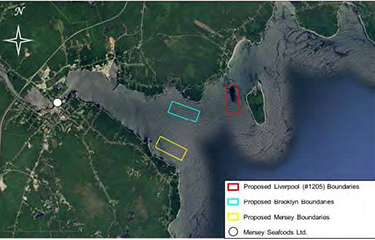The Nova Scotia Aquaculture Review Board (NSARB) has announced its decisions on who will get intervenor status at an upcoming hearing reviewing a proposal by Kelly Cove Salmon – a subsidiary of Cooke Aquaculture – to expand its Atlantic salmon aquaculture operations in Liverpool Bay, Nova Scotia, Canada.
The public hearing, scheduled to take place from 5 to 9 February 2024, will review Kelly Cove’s application for a boundary amendment and two new marine finfish aquaculture licenses and leases in Liverpool Bay, located in Queens County, Nova Scotia. The plan is part of a wider expansion effort in Nova Scotia by Cooke, which has received approval to build a recirculating aquaculture system (RAS) hatchery near Centreville on Digby Neck, Nova Scotia, and a boundary amendment for its Nova Scotia salmon farm off Rattling Beach.
Kelly Cove is seeking two new leases each creating aquaculture sites covering 40.7 hectares each. The boundary amendment would result in site containing 20 cages and 660,000 Atlantic salmon. The two new leases are both the same size, and would also be stocked with 660,000 Atlantic salmon each, for a total of 1.98 million salmon across the three locations.
The NSARB said of 12 applications for intervenor status, just five were approved – with all approvals given to groups representing interests in the region. The board handed out approvals to the Kwilmu’kw Maw-Klusuaqn Negotiation Office (KMKNO), Queens Recreational Boating Association (Brooklyn Marina), a coalition of 23 Fishermen of Liverpool Bay, the Region of Queens Municipality (RQM), and the Protect Liverpool Bay Association (PLBA).
The KMKNO argued the expanded aquaculture location will limit the amount of area that Mi’kmaq have to fish in in Liverpool Bay, displacing fishers and impeding with the court-affirmed right Mi’kmaw have to fish for food, social, and ceremonial purposes in the area. The KMKNO also argued that nearby Mi’kmaw archaeological sites could be disturbed by the farm.
“We feel there has been Inadequate testing in the marine environment for archaeological resources and that no decisions should be made or any work done until such time as that the Maw-lukutijik Saqmaq (Assembly of Nova Scotia Mi’kmaw Chiefs) see adequate data to comfortably eliminate concern for the presence, protection, and management of Mi’kmaw archaeological and cultural heritage,” KMKNO said.
The Queens Recreational Boating Association argued the farms will have an “immediate and permanent negative impact on the recreational boating community.” The association claimed the size of the operations would impede sailboats’ ability to do tacking maneuvers into and out of Liverpool Bay, and also cause an “immediate and immense negative appeal for our region” causing visitors to bypass the area for other regions of Atlantic Canada that do not have salmon farms present.
Kelly Cove argued it has successfully farmed salmon for 25 years along Nova Scotia’s southern and western shores, and that it has had its marine aquaculture licenses and leases renewed after 10 years.
“These new Liverpool sites will allow Kelly Cove to improve its operational efficiencies in production and harvesting and will result in up to 20 new direct jobs,” the company said. “At every step of the way, Kelly Cove has complied with our current lease and new license and lease application process, and in February our representatives will present how the company meets all the regulatory criteria to the ARB.”
The original applications for both the expansion and the new leases were submitted on 6 March 2019, meaning the hearings will take place nearly five years after the original submission.
Image courtesy of Nova Scotia Aquaculture Review Board







